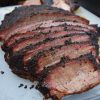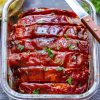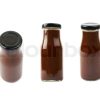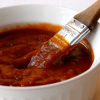Best Vinegar Based BBQ Sauce Recipe
Vinegar-Based BBQ Sauce: A Deep Dive
:max_bytes(150000):strip_icc()/GettyImages-184336980-56a073553df78cafdaa1bd55.jpg?w=700)
Source: thespruceeats.com
Best vinegar based bbq sauce recipe – Vinegar-based BBQ sauces offer a unique tangy counterpoint to the richness of smoked meats, representing a distinct style within the broader world of barbecue sauces. Their sharp acidity cuts through the fattiness, creating a complex and refreshing flavor profile that has captivated generations of barbecue enthusiasts.
Introduction to Vinegar-Based BBQ Sauces
Vinegar-based BBQ sauces are characterized by their prominent sourness derived from vinegar, balanced by sweetness, often from sugar or molasses, and a blend of savory spices. Unlike ketchup- or mustard-based sauces, the vinegar provides a bright, acidic note that cleanses the palate between bites of rich, smoky meats. These sauces are less viscous than their ketchup-based counterparts, tending towards a thinner consistency.
Historically, vinegar-based sauces are strongly associated with the Carolinas, particularly the eastern portion of North Carolina. The use of vinegar in barbecue sauces in this region dates back to the early settlers who utilized readily available ingredients. Regional variations exist, with some emphasizing a sharper, more acidic profile, while others incorporate sweeter elements. The type of vinegar itself contributes to the regional differences, with apple cider vinegar being particularly common in some areas.
Various vinegars contribute distinct flavor profiles to BBQ sauces. Apple cider vinegar imparts a subtly sweet and fruity note, while white vinegar provides a sharper, more intense acidity. Red wine vinegar offers a more complex flavor with hints of fruit and earthiness.
Key Ingredients and Their Roles

Source: jesspryles.com
The balance of ingredients is crucial in crafting a well-rounded vinegar-based BBQ sauce. Each component contributes significantly to the overall flavor and texture.
Vinegar provides the signature tang and acidity. Sugar balances the acidity and adds sweetness, impacting both flavor and texture. The type of sugar used significantly affects the final product; brown sugar adds a deeper, molasses-like flavor and a richer texture, while granulated sugar provides a cleaner sweetness. Spices provide complexity and depth, adding warmth, smokiness, or heat depending on the selection.
The careful selection and proportioning of spices are vital in achieving a nuanced and flavorful BBQ sauce. The following table Artikels some common spices and their typical flavor profiles:
| Spice | Flavor Profile | Suggested Quantity (per cup of sauce) |
|---|---|---|
| Black Pepper | Sharp, slightly spicy | 1/2 – 1 teaspoon |
| Paprika | Sweet, smoky (depending on type) | 1-2 teaspoons |
| Garlic Powder | Savory, pungent | 1/2 – 1 teaspoon |
| Onion Powder | Savory, slightly sweet | 1/2 – 1 teaspoon |
| Cayenne Pepper | Hot, spicy | 1/4 – 1/2 teaspoon (adjust to taste) |
| Cumin | Earthy, warm | 1/2 – 1 teaspoon |
| Smoked Paprika | Smoky, sweet | 1-2 teaspoons |
Recipe Variations and Adaptations
The beauty of vinegar-based BBQ sauce lies in its adaptability. Here are three variations, showcasing diverse flavor profiles:
Tangy Vinegar BBQ Sauce: This recipe emphasizes the sharp acidity of the vinegar, balanced by a touch of sweetness and a simple spice blend. It’s perfect for those who appreciate a bright, clean flavor.
Smoky Vinegar BBQ Sauce: This version incorporates smoked paprika and liquid smoke for a pronounced smoky flavor. It pairs well with ribs or brisket.
Sweet and Spicy Vinegar BBQ Sauce: This recipe balances the tanginess of vinegar with brown sugar for sweetness and a generous pinch of cayenne pepper for a kick. It’s a crowd-pleaser for those who enjoy a little heat.
Unusual Ingredient Variation: Consider adding a teaspoon of finely grated ginger for an unexpected depth of flavor to any of the above recipes.
Dietary Adaptations: For gluten-free versions, ensure all ingredients are certified gluten-free. Vegan options can be created by substituting honey or maple syrup for molasses.
Cooking Methods and Techniques
Vinegar-based BBQ sauces can be prepared using various methods, each affecting the final outcome.
Stovetop Method: This method offers precise temperature control, allowing for careful monitoring of the sauce’s consistency and flavor development. Simmering for 20-30 minutes allows the flavors to meld and the sauce to thicken slightly.
Slow Cooker Method: The slow cooker method is ideal for a hands-off approach. Simmering on low for several hours allows the flavors to develop fully, resulting in a rich and complex sauce. However, the slow cooker may not thicken the sauce as effectively as the stovetop method.
Simmering time and temperature are crucial for developing flavor and texture. Lower temperatures allow for gentle flavor development, preventing burning. Higher temperatures can lead to rapid thickening but may scorch the sauce. Achieving the desired consistency can be managed by simmering longer for a thicker sauce or adding a cornstarch slurry for rapid thickening.
Serving Suggestions and Pairings
Vinegar-based BBQ sauces are incredibly versatile and pair well with a variety of meats and dishes.
Ideal Pairings: Pulled pork, chicken, ribs, brisket, and even grilled vegetables benefit from the bright, tangy flavor of vinegar-based sauces. They also complement grilled or smoked meats beautifully.
Application: The sauce can be applied during the final stages of cooking to prevent burning, or as a finishing touch after cooking. A basting technique during grilling or smoking infuses the meat with flavor.
Enhancing the Dining Experience: Serving the sauce in a small bowl alongside the main course allows guests to control the amount they add. Consider pairing the BBQ sauce with coleslaw or potato salad for a complete meal.
Visual Guide: Texture and Consistency, Best vinegar based bbq sauce recipe
The ideal texture and consistency of a well-made vinegar-based BBQ sauce is crucial to its appeal.
Finding the best vinegar-based BBQ sauce recipe often involves experimenting with different tangy elements. For a unique twist, consider incorporating unexpected sweet and tart components; a fantastic resource for inspiration might be checking out some whole cranberry sauce recipes to see how their balance of sweetness and acidity could translate to a BBQ sauce. The resulting sauce could offer a delightful complexity, showcasing the versatility of vinegar in achieving the perfect flavor profile.
- Viscosity: The sauce should have a moderate viscosity, neither too thin nor too thick. It should coat the back of a spoon but not be overly syrupy.
- Body: The sauce should possess a good body, meaning it feels substantial and full in the mouth, not watery or thin.
- Mouthfeel: The mouthfeel should be smooth and slightly tangy, with a pleasant balance of sweetness and acidity. Any lingering bitterness should be minimal.
- Visual Appearance (during cooking): Initially, the sauce will appear relatively thin and watery. As it simmers, it will gradually thicken, becoming slightly more viscous and glossy.
- Visual Appearance (finished): The finished sauce should have a smooth, glossy appearance, with a rich, deep color depending on the ingredients used.
Troubleshooting Common Issues
Certain issues can arise during the BBQ sauce making process.
| Problem | Solution | Prevention |
|---|---|---|
| Burning | Reduce heat, stir frequently | Use low to medium heat, stir constantly |
| Too Thick | Add a little water or vinegar | Reduce simmering time |
| Too Thin | Simmer longer, or add a cornstarch slurry | Ensure correct ratio of ingredients, simmer sufficiently |
| Lumpy Sauce | Strain the sauce through a fine-mesh sieve | Use smooth ingredients, stir constantly |
Essential Questionnaire: Best Vinegar Based Bbq Sauce Recipe
Can I make this sauce ahead of time?
Yes, vinegar-based BBQ sauces generally improve with time. Make it a day or two in advance to allow the flavors to meld.
How long will the sauce last in the refrigerator?
Store it in an airtight container in the refrigerator for up to a week.
Can I freeze vinegar-based BBQ sauce?
Yes, you can freeze it for up to 3 months. Thaw it slowly in the refrigerator before using.
What if my sauce is too thin?
Simmer it longer to reduce the liquid. You can also add a cornstarch slurry (cornstarch mixed with cold water) to thicken it.
What if my sauce is too thick?
Add a little water or vinegar to thin it out to your desired consistency.














